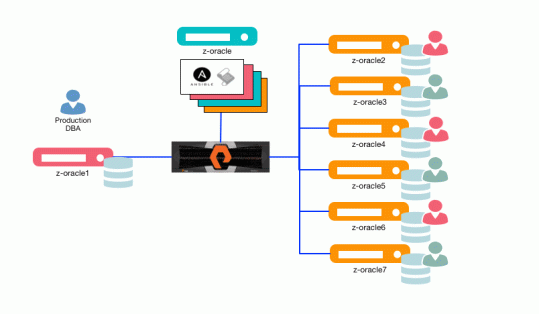In this Blog post I will share another short video demonstrating how storage data services can be used to perform many common data management tasks using simply scripting, DevOPS automation tools and Pure Storage REST API’s .
Oracle 12c multiple databases clones with Ansible
Before we jump into the demonstration let me detail my architecture and explain what you are going to see, first the Architecture.
The Architecture
z-oracle will be used as my Ansible control machine
z-oracle1 is where my production Oracle 12c database is hosted
z-oracle2 thru to z-oracle7 are my development / test database servers.
FlashArray will be used to deliver the storage data services.
The Ansible Playbook
The database_clone Ansible playbook performs the following steps:
- Performs crash-consistent storage snapshot of production database using REST API.
-
The storage snapshot is instant, has no impact to the running production database, and does not require any changes to production server or database configuration.
-
- Shutdown non-production database(s) and unmount database filesystems.
- Refresh non-production volume(s) from latest storage snapshot.
- Mount database filesystems and start database(s).
-
At this point the non-production database(s) are exact copies of the production database with the same name as production but consuming no space.
-
- Rename non-Production database, datafiles and directories.
If you have watched the video you will have seen that the 6 non-production databases have all been refreshed from production in less than 2 1/2 minutes from a single Ansible playbook.
Visit code.purestorage.com to see more Ansible examples and also find examples for other DevOPs tools and languages including Python, PowerShell, Puppet…
[twitter-follow screen_name=’RonEkins’ show_count=’yes’]
